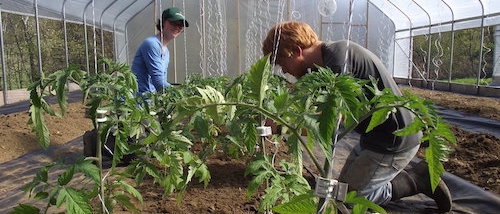By Andrew Mefferd
It became clear in March that the COVID-19 outbreak would disrupt almost every facet of life. So, we reached out to growers, asking for constructive ways they were keeping business going as safely as possible during the pandemic to share with you.
We were inundated, both in the volume of responses and the quality of solutions. We sorted through dozens of emails and messages and did phone interviews to bring you this story about how growers are dealing with the pandemic.
Common themes
All the growers we talked to reported off-the-charts demand for local food and flowers. Our challenge in the short term is to keep feeding people, keep our businesses running and stay healthy. In the long term, we need to keep the momentum going. We will stay on this story as it develops.
There was a clear trend towards electronic payments to facilitate prepaid boxes for quick pick up or drop off, and to eliminate physical contact during payment. Even if you don’t currently take electronic payments, if you have a website, chances are your website can easily be configured to take electronic payments. If you already have a card reader to take credit card payments at markets (like Square or others), those accounts can be configured to take online payments. Contact your payment processor or web developer for more info.
And when it came to food safety, growers took this opportunity to reevaluate practices and make sure they are in line with their state’s recommendations on food handling in the COVID era, and review the plan with the crew.
Bouquets and boxes of vegetables to go and preorders were also strong trends. We talked to multiple farms who never had a CSA before who started them overnight in order to make up for lost markets. A lot of produce that is not boxed is being bagged or otherwise pre-packaged in order to minimize customer handling. Even farms that are not selling by CSA share are boxing produce for quick or drive-through pickup.
Take it seriously
I talked with Ellen Trimarco from Little Pond Farm in Bushnell, Florida. We’ll get to how they’re selling their five acres of certified organic vegetables and flowers through this crisis in a minute. In addition to farming, Ellen has a background in microbiology, and it was helpful to hear how that has informed her decisions about food safety on the farm.
“This virus is very serious. People need to treat it like that. We’re entering a new phase here. Farmers really need to be thinking outside of what is normal and we couldn’t do this any sooner,” said Ellen.
“I want to add that I worked for Princeton University for three years sequencing the DNA of novel bacteria in gold mines in South Africa. I’ve worked for the CDC at a state health lab on infectious diseases. I’ve worked in a genomics lab sequencing DNA for 10 years and that gave me a deeper understanding of how microbiology works. As well as being a farmer and being our integrated pest management manager.”
“This virus is very contagious, so I think it’s vital to think outside the typical market models, and do a box. I think that’s the safest thing to do right now. The demand is really high for boxes, it just takes some finagling of your business if you’re not currently doing that. But I think it’s the responsible thing to do,” she said.
“I guess what I would say is that we as farmers, with the connection with our customers, that we’re leaders in our community. And now is the time to show the public that we prioritize public health and that we’re taking this really seriously. After all this is said and done, they will have seen that we’ve done our part to protect the public, and to be able to get them food no matter what.”
Moving to drive-through
Of Little Pond Farm, Ellen said, “We’re a market farm primarily, then a wholesale farm. And we’ve worked our CSA into our market model. It’s been a success moving from boxes to pre-paid farm cards our members can use at the market. But as markets became uncertain as of last week, we started considering we might have to do boxes only.”
“And lo and behold our mayor banned gatherings of 50 people or more. So, we used Square to create a one-size-fits all farm box with a few add-ons we thought people would like. Like one-pound strawberry boxes, sprouts, flowers and 2oz turmeric bags. It’s been a big success so far, and we’ve had a ton of community support.”
To see the online store they made, check out littlepondfl.com/veggieshares/.
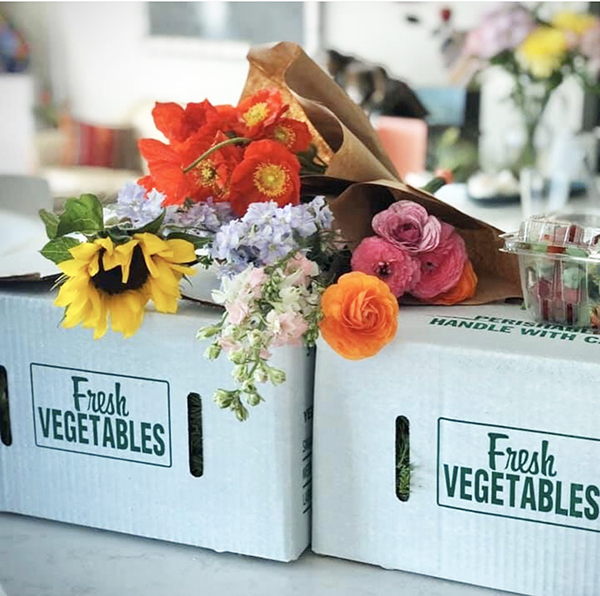
They are having customers pre-order online then drive by their tent to pick up their stuff. “It is the low-touch environment. We will also be doing home delivery during this drive-through market. We will have employees driving to peoples addresses, ringing the bell, and dropping off their box at the door. No interactions,” said Ellen.
“The other thing I want to say to farmers is that we have the joy and sometimes burden of being independent and creative. All of our businesses are different. Unlike supermarkets we have the option to do a box of vegetables for people. The choice is in our hands to protect people and our public health. It’s the responsible thing to do if our aim is to get folks the food they need to stay healthy, that can be accomplished with the box, gloves, social distancing, drive-through markets, etc.”
In places where it wasn’t possible to convert the local farmers market to drive-through, we heard of two models where growers were still able to connect with shoppers that way. In the first example, a grower told us how a restaurant they work with, Newtown Baking in Staunton, Virginia is doing a “Local Food Drive-Thru.”
Newtown Baking says, “In response to the Coronavirus outbreak, Staunton-Augusta area food producers have created an easy way to get the foods you need and love. The Local Food Drive-Thru is a pre-order grab-n-go system in which we place food directly in your car when you pull into the Newtown Baking parking lot—without any person-to-person contact. A gloved helper (with verified body temperature) will place groceries in your car without making contact,” they say. Check it out at localfood-drivethru.org.
The beauty of this solution is that it doesn’t require the associated business to actually have a drive-through window, since the produce is dropped in the car. Though if you’re thinking of doing this kind of thing, it probably would be good to work with a business that will be deemed essential (like some food businesses) in the event that nonessential businesses are shut down.
We also heard from growers partnering with businesses that actually have drive-through windows to sell farm goods. Another way to work with a drive-through, without them having to handle the goods, has been to set up a farm market tent/stand just before or after the drive-through, so customers of the brick-and-mortar store can buy farm products before or after going through the drive through.
There are two advantages to setting up next to a drive-through. For one, it doesn’t require the brick and mortar business to do anything except own the land and give you permission to be there. And secondly, since it is private property, in most cases you don’t need a license to be there as long as you have the owner’s permission, and are staying within the limits of people congregating, however that is being regulated by your community.
In the current climate, having local food for sale may well draw more business to drive-throughs! Or there could be other ways a farmer could thank a drive-through business. In the instance of collaborating with the bakery, the farmer paid for a cupcake for each farm customer, or the drive through owner could get a free box of produce or bouquet.
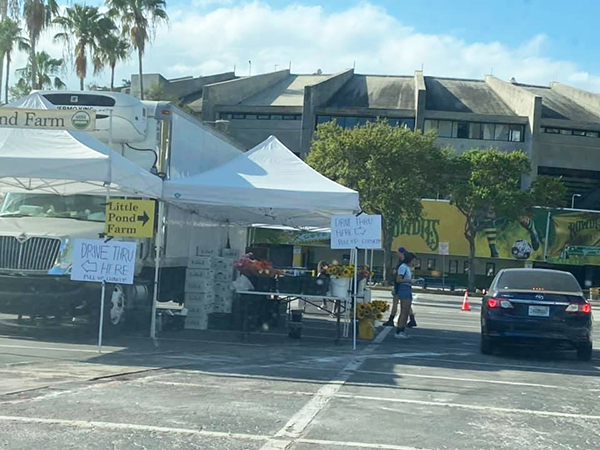
Little Pond Farm’s reconfigured drive-through farmers market at a stadium in St. Petersburg, Florida. Cars pull up to the tent and receive their produce and flowers.
Collaborating to increase CSA reach
We heard from Cheryl Nunes at River Queen Greens, a market garden in the city of New Orleans. She said, “We are right in the middle of our busiest growing season down here. Prior to COVID we were participating in one farmers market per week and had just launched a 45-member farm share in February through Harvie, the online customizable CSA platform. We launched our share about a month before COVID took over the city and are feeling so grateful that we made that transition when we did. Our existing relationship with Harvie allowed us to shift our operation and scale up quickly.”
“As soon as COVID hit we immediately decided to opt out of the farmers market, which has subsequently closed entirely, and pivot that traffic to increasing our farm share. We reached out to other growers in our region who we knew would be losing outlets because of closing restaurants and markets and quickly determined that with additional offerings from other growers, we could almost immediately quadruple our farm share capacity,” she said.
“So, we did. We scrambled to purchase more packaging and bagging supplies, organize food-service experienced volunteers to help pack, expanded and relocated many of our pickup sites in accordance with changing regulations and business closures, ramped up our sanitizing SOPs and added another day of work per week in an effort to accommodate the skyrocketing demand for local food in our city. We tweaked our pickup system so that members only touch their own shares, and we offer home delivery to high-risk and/or quarantined members.”
“We are communicating regularly with other growers, market staff, and food access organizations who are all working around the clock to do the same. We are all selling out of our food within hours and are trying to meet the demand as best we can. We are so grateful to be able to continue this work in this moment of crisis in our city, and we have received an outpouring of gratitude that has kept us grounded and almost sane as we fight exhaustion and the overwhelming interest.”
“Fresh food is hard to come by right now for many residents, and we are humbled and honored to provide this service. Local agriculture is still a small part of the food economy here, but we believe it is an important piece of the puzzle to keeping our residents healthy and out of the hospitals.”
Adding food to the flower farm
Jessica Chase from Sierra Flower Farm in Gardnerville, Nevada got in touch about how their business is changing now that most weddings are on hold indefinitely. “We are a family run flower farm/farmer-florist and this year we were gearing up to heavily focus on weddings, especially destination weddings. We were pulling back from a couple of our normal outlets, such as farmers markets. We were also continuing with our flower subscription, but I had pulled back from home delivery and made friends with local businesses to be pick-up sites. We were also heavily focusing on producing videos for our YouTube channel. You can see we were on a very different path and it was just beginning to pay off.”
“With everything in chaos, we’ve switched gears quick. Placed a big order of vegetable seeds from Johnny’s and fingers crossed we will actually get them. Once seeds are in hand, we will begin making announcements to our community of the changes. We will now be offering a vegetable CSA with the add-on of a flower subscription.”
“Especially if lockdown occurs, our flowers become nonessential (well not in our opinion, they’re always an essential for a happy heart) but vegetables are groceries therefore are deemed essential. This way we can nourish our customers bodies and their souls in one swoop. We will be offering no-contact delivery.”
“And since finances will be difficult, we will have an option for weekly payments instead of paying everything up front. I know financially, we are in a terrible spot. We’ve poured everything into the flowers and this is the time of year we would normally be making some of that back.”
“We even had to borrow money to be able to invest in vegetable seeds. I know many others in our community are in a similar situation. The stores were raided before we got paid so when we could afford to buy groceries the shelves were bare. It’s ugly.”
“So far, our weddings haven’t been cancelled but our first one isn’t until June. We will still be growing flowers as scheduled, since we have no clue what will happen in the coming months and we do have weddings on the books. Fortunately, for the most part, they are a la carte weddings where they have to pick them up. Even if people move to ‘virtual’ weddings, they’ll still want that bridal bouquet.”
“We’ll just be playing the summer weddings day by day. We’re also anticipating an uptick of last-minute orders from brides and local florists. We’re opening additional ground for vegetables and cutting back on some flower varieties to make room for more vegetables. Also upping some of our dual-purpose crops such as amaranth, millet, calendula, herbs and tomatoes to name a few.”
“We are still going to be creating videos to share some beauty and hope to those who cannot leave their homes. A lot of entertainment has been pulled along with extracurricular activities but, for the most part, everyone will have internet. So, YouTube! Plus, if our flower sales really go down at least we can still share them and put them to some use.”
“The bottom line is that our communities need growers. Though I prefer growing flowers under normal circumstances, and I feel they will bring comfort, the biggest comfort is food security. We live in an area where most people cannot go out and easily grow their own food nor do we have many local growers in our town.”
“We need to do our part during this crisis, and we intend to do the best we can. We don’t have incredible amounts of land or infrastructure, but we’ve gotten good at boot strapping and know how to plant intensely. Making the switch is both saddening and empowering. This was not on my radar a week ago, but as growers we have to be ready to switch gears. Especially those of us who grow niche products. There’s been a shift in our world and for better or for worse there is no going back. I know vegetables will always be a chunk of our business model from now on. I don’t ever want it to get to the point where my husband suggests eating the dahlia tubers!”
When your entire market dries up
I called up Jonathan Leiss of Spring Forth Farm in Hurdle Mills, North Carolina, to talk about re-diversifying in response to the coronavirus. He is the author of this month’s article about consolidating markets on a flower farm, see page 27. After exploring all the outlets for their flowers over the years, he landed exclusively on wholesaling to local florists and designers. Which of course was completely disrupted by COVID.
Jonathan said, “Last week, I still think we got our normal orders. And we’re expecting this Monday to have basically nothing. One reason is that florists are losing events. But the bigger reason why I have zero orders on Monday is that although North Carolina is not in any sort of mandatory quarantine, I think everyone expects it to come.”
So they started doing “social distance flower bunches,” delivered right to customers. They sold out for three weeks in 24 hours. “At the time, we had only listed 40 bunches per week. I think we’re going to double that to 80 per week. At that time, we didn’t expect the florist sales to fall off quite as precipitously as we do now. And we didn’t want to sell out all our flowers retail and then not have flowers for our wholesale customers.”
“And then secondly, the limiting capacity is our ability to do home delivery. It’s not the amount of flowers we have. Charging a delivery fee will allow us to pay our employee to deliver, and, that expands our capacity to have two people delivering.”
“We sold them through a Square shop. They were not sold directly through our website, but we have an account with Square. And so they were sold through Square’s free e-commerce thing that you get just by having a Square account. You can look at that if you want. It’s SpringForthFarmnc.square.site. You can go see how that storefront is set up.” Though Jonathan notes that one way they were able to pivot and sell out of a brand new product so quickly was because they had so many connections from doing other markets over the years, including an email list they could send to as soon as the social distancing bouquets were launched.
Also in North Carolina, I talked to Evan Chender of The Culinary Gardener. Until last week he sold exclusively to about a dozen restaurants. “For the last six and a half years, The Culinary Gardener has supplied restaurants in Asheville, and only that. So, 100% of our sales are direct to restaurants. And it’s never been anything else but that. So, I have no idea how to run a CSA,” said Evan.
“So this has been an extreme challenge. And the craziest part is just the minimal amount of time I had to put it all together. 75% of my sales evaporated overnight, but it turned out by the end of the week, it was more like it was 90%. They went from $2,500 two weeks ago, to last week it was $270 or something.” So, he decided to do $25 CSA-style produce boxes.
“And so, I used the platform of social media to try to get the word out there that I was trying to do this new endeavor. And to get it up and running ASAP, that week. I basically had to get it all setup in two or three days.”
“And now people are getting frustrated that it’s selling out so quickly. It sold out within two hours of me posting and sending out the email last night. So now we’re doing 100 shares, or a little bit more. It’s crazy. In a week, I became a 100 share CSA farmer.”
After collecting the first week’s payments through Venmo, Evan has hired someone more tech savvy to set up an online store for him that will handle the payments. A store will also allow him to add individual ala carte options for items that can’t be split up between the entire CSA.
“And hopefully that’s going to allow me to generate that extra level of income, because right now the income is somewhat comparable to what I would have been making. It’s probably 75% of what I could be doing this week in sales to restaurants. But come May, I’m going to need to be selling 300 plus boxes a week to be able to be doing the kind of numbers that I was doing last year.”
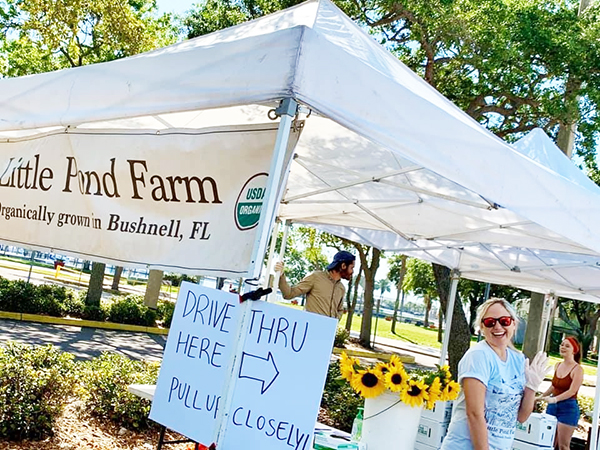
Reconfiguring markets
I talked to Nate Drummond of Six River Farm in Bowdoinham, Maine because they were one of the first farms I heard of doing grab-and-go boxes.
“We do a mix of different outlets, but certainly over the course of the year and even more so in the winter, two thirds up to 75% of our sales are at farmers markets. And our big winter farmers market in a mill building in Brunswick is super busy and super close spacing between vendors and customers. I think it was clear from the get-go that if there was going to be a serious level of infection and any sort of shutting down of public spaces, that that type of market, at least in terms of the volume that we expected from it, was just not going to be viable.”
“So we were already thinking about a contingency plan, and that was just the easiest thing we could think of. If we can’t do a farmer’s market, how do we still get things to customers? And the easiest thing would be to set up somewhere, they could come to us. We’d just pre-pack it and they could just grab a box or a bag for a certain amount.”
“The easy part was coming up with the idea of going to a grab-and-go bag and box. The hardest thing was trying to figure out what that meant on the farm level, as far as packaging it, as well as communicating to customers what we were doing.”
“What we’re doing has evolved. We’ve done two $20 grab-and-go bags, and one has a mix of winter greens. It’s sort of 50/50 winter greens, 50/50 root crops, as far as the value. And then there’s another box that’s more heavy on the greens, so it has a greater diversity of salads and cooking greens and then some miscellaneous crops.”
“And then we have a bunch of roots that we’re just packing out in $5 bags, if people want a $5 bag of carrots, $5 bag of beets or parsnips. Whatever we have for standard root crops, we’re doing that with the idea being people can grab either a $20 assortment or a more specific $5 single crop bag.
“And then we recently started doing a $40 box. Because, again, the question was all of a sudden looking more long term, honestly, how do we merchandise watermelon radish? No one wants a $5 bag of watermelon radishes. How do we get them out? We don’t want to give someone three pounds at one time. So, the $40 box seems to be where we can add some of these odds and ends in.”
“We very quickly decided, at least for the moment, we’re just going to not do the full-service farm stand. We just nixed that side of things and said, ‘You know what? To be really safe and really diligent and control the flow of customers better, we need to go to just the grab-and-go self-service.’ And so that is what we’ve done the past week.”
“This past Saturday we set up two tents, but each tent had a matching grab-and-go selection so that when customers came up, we could communicate to them, ‘You can go to either tent.’ Essentially, each tent was staffed by one person, but that person’s sole job was just to re-stock and communicate to customers. So that person was standing behind the table at a safe distance saying either, ‘Hey, this is what’s in the grab-and-go bag, here’s the money jar.’ And then also would be able to essentially wave in the next customer saying, ‘Okay, you can come in.’”
“The other thing we did right away is we set up a very basic self-serve farm stand in part of one of our barns. We just decided to have it open seven days a week, 8:00 to 6:00 and just have grab-and-go items there with a little box with a slot for checks and cash. And that, honestly, has been the biggest surprise because that has been just steadily busy. And I think people are super appreciative of just us making the decision that we’re going to have it open all the time.”
Dealing with uncertainty
Farmers Michael and Shanon Whamond of Hillview Farms in Auburn, California started boxing veggies because they expected their markets to be canceled, but then they weren’t.
“This whole situation’s been a bit of a roller coaster on the marketing side because we’ve had no idea where our sales are going to land. In the beginning, when Michael and I first tried to plan out what we would do, we were planning with the idea of the farmers markets ultimately being canceled. And we are mostly direct to customer. So that was a pretty hard thing for us to comprehend,” said Shanon
“Our first move was putting the ball in our court. We were lucky enough that we had our online store already set up because that’s what we use over summertime to do a preorder CSA box kind of thing. I just reopened that back up and put out a little newsletter saying, ‘Hey, community, we’re here for you. We know things are crazy. The one thing that we can offer you is an outlet to be able to buy your produce while being able to avoid the crowds.”
“We tried to market that really hard in the beginning because we thought that we were going to have to rely on it. We were concerned that our farmers market sales were going to really go down. But it’s been wild because quite the opposite has happened. There’s a huge, huge, huge influx of interest in local food. Just by me doing my little newsletter, my phone has been ringing off the hook, our email inbox is at capacity. It’s been wild. I didn’t realize how much of a shift this whole thing would create. There’s a microscope on local farms right now, which is great.”
“But ultimately we weren’t prepared for this. We’re just trying to figure it out. The first week with the boxes, they sold out within the first five hours. We were able to fill all those orders. We capped it at 50 boxes. People came out to the farm to pick up. We were really strict on the rules for that. We were like, ‘Hey, this is strictly just a box pickup. This isn’t a time for any farm tours or anything.’ We just kept it really simple. And then we heard word from the state that farmers markets were deemed essential businesses and that they would stay open.”
“So we took a step away from the boxes and thought, ‘Okay. At this point we’re just going to try to provide the farmers market with food.’ But also do it in a manner that’s as safe as possible. Our way to adapt to that was to do grab and go boxes. We didn’t take any preorders on them because I didn’t have the bandwidth to keep up with all these emails and influx and interest. So we packed 70 boxes or something. And we said, ‘First come, first served. It’s the best of what’s in season right now and you can get the box and avoid having to shop. So it’s just really quick grab and go. Avoid crowds, keep it nice and simple.’ And those boxes sold out at the farmers market in an hour and a half,” said Shanon.
Enabling custom ordering
I talked to Ellen Enouen of Long Season Farm in New York State, after I saw the online pre-packed custom order system that she put up on the fly to make up for closed markets. “We are a certified organic vegetable farm in Kerhonkson. We manage 12 acres, but we grow on four every year. And we grow every crop we can. We’re a full vegetable spectrum. We go year-round. So, we are harvesting, packing and selling every week of the year,” said Ellen.
“Two weeks ago, which feels like it has been a year, I was at the farmer’s market and I had gloves on and was taking special precautions, but it was business as usual. Since then, for two weekends, our markets have been canceled.”
So, Ellen set up an online ordering system to sell the produce she would have sold at market in pre-bagged custom orders. “I have experience with e-commerce from a previous job, so I knew what I needed to look for. First, I Googled to see what I could do with our existing website. So, e-commerce plugins for wordpress.com. That’s what I searched. One that came up was Blue Commerce, which is an open source, e-commerce plugin with lots and lots of add-ons. It had pretty good reviews. It was free. And so in that one minute, I said ‘Okay, I’m doing it.’ So then, I just used that. It’s pretty simple for people that have a website to do that and to follow the cues. But I do think the technology is a barrier to many farmers.”
“But for 80 retail orders, you have to come up with a system for packing the orders and checking them off so that you know you’ve done everything. Those are the types of systems on the backend that might have to change. Some farms might have something like that already and then they can just plug something like this in.”
“Another thing we considered was, setting up an online square store. A lot of farms take square at the farmer’s market. If you have a square account, it’s really easy to make an online square store. The website will have your farm name and then square.com, and it’s super, super easy (see the example from Spring Forth Farm above). So that’s another route to go because I think it’s even a little easier.”
“Another option is Squarespace, which is another website company. If you build a website through them, those sites come with product listing as part of the website. Because it’s made to be an out of the box e-commerce site. Whereas Wordpress is not, though it is very adaptable to different situations. And then another option is Shopify which has a lot of functionality but might cost a little bit more.”
“This is a very unique situation that we’re adapting to, some of the things don’t really translate to when things may ease up a little bit. But I do feel like once a lot of us go in this direction, it’s going to be hard to not do pre-orders anymore.”
“I think some of the people that are really intimidated by the technology might be able to reach out to their customers and see if anyone could help because there are so many people that have these skills, that might have the time and ability to help a farmer out right now for some of this tech stuff.”
Andrew Mefferd is the Editor of Growing for Market. He farms in Maine.


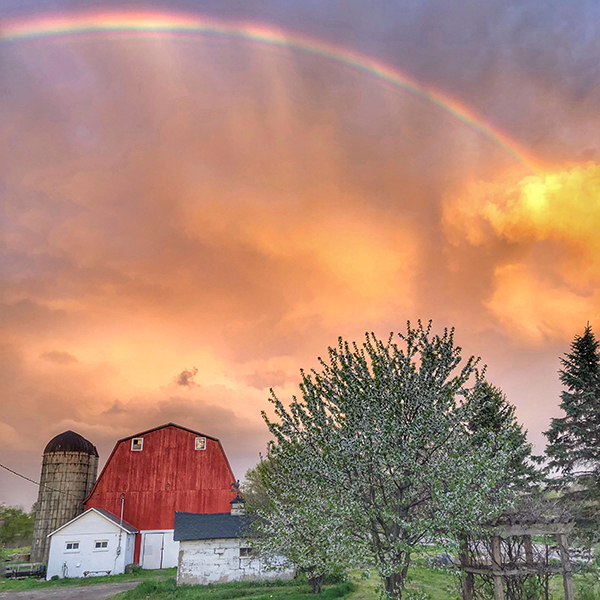 Settle in, the changes aren't just for the short term
Settle in, the changes aren't just for the short term
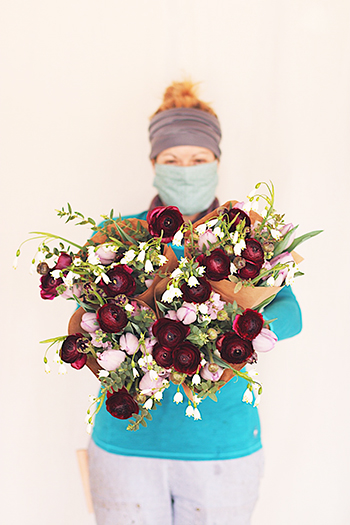 Practical advice on what’s working to replace lost business
Practical advice on what’s working to replace lost business
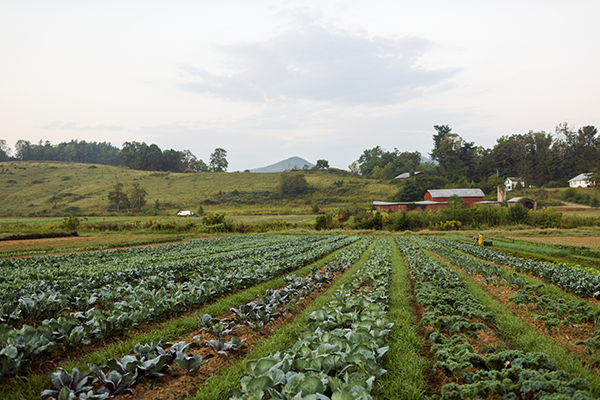 It’s not too late for online/preorder seedling sales, farmers market custom bags, and We Give a Share
It’s not too late for online/preorder seedling sales, farmers market custom bags, and We Give a Share